Kosher salt's pure sodium chloride composition makes it your best choice for fermentation projects. You'll get consistent results because it doesn't contain trace minerals or additives that can interfere with beneficial bacteria growth. Its larger crystals dissolve at an ideal rate, creating uniform brines that preserve vegetables evenly. While sea salt varies in mineral content and dissolution rates depending on its source, kosher salt's standardized structure guarantees reliable fermentation every time. It's also more affordable and widely available than artisanal sea salts. The science behind salt's crystal structure and fermentation reveals even more compelling reasons to choose kosher.
Understanding Salt Crystal Structures
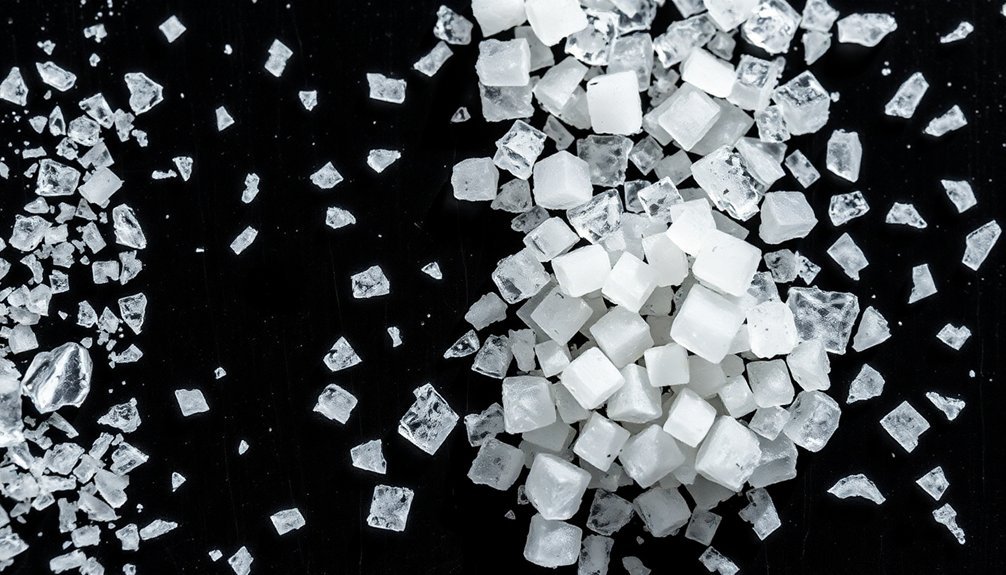
The basic crystal structure of salt reveals why it's such a stable and effective compound for fermentation. When you examine salt at a molecular level, you'll find a precise three-dimensional arrangement of sodium and chloride ions forming a face-centered cubic lattice structure. Each sodium ion is surrounded by six chloride ions, and vice versa, creating a perfectly balanced and stable compound. This exact structure has made salt crucial for preservation throughout human history.
This structured arrangement isn't random – it's nature's most efficient way of packing these ions together. In the unit cell, which is the smallest repeating unit of the crystal, you'll find sodium ions at the corners and face centers, while chloride ions occupy positions along the edges and within the cube. This arrangement maximizes the attractive forces between opposite charges while minimizing repulsion between like charges.
When you break apart a salt crystal, it tends to fracture along these structural lines, creating smaller but similarly shaped cubic crystals. This predictable geometric pattern is essential for understanding how different types of salt crystals interact with water and food during fermentation, as the crystal size and shape affect dissolution rates and surface area contact.
Salt Purity Matters
When you're choosing between kosher and sea salt for fermentation, you'll need to watch out for anti-caking agents that can interfere with beneficial bacteria and affect your final product's quality.
While both salts can be excellent choices for fermenting, their natural mineral content varies considerably, with sea salt typically containing more trace minerals from ocean water.
You'll find the purest versions of either salt work best for fermentation, as they're free from additives that could compromise the process. The grainy texture of kosher salt may affect how quickly it dissolves in your brine solution.
#
Anti-Caking Agents Impact
Salt purity plays a critical role in successful fermentation, with anti-caking agents being a major concern. You'll need to pay close attention to these additives, as they can greatly impact your fermentation results. While kosher salt often contains anti-caking agents that can disrupt fermentation and create off-flavors, sea salt typically doesn't have these additives. Traditional fermenters recommend 2% to 5% brine for optimal results.
| Salt Type | Anti-Caking Agents | Impact on Fermentation |
|---|---|---|
| Kosher Salt | Often Present | Can inhibit bacteria growth |
| Sea Salt | Usually Absent | Promotes healthy fermentation |
| Refined Salt | Always Present | Disrupts fermentation process |
When you're choosing salt for fermentation, you'll want to carefully check the ingredient list. If you're using kosher salt, verify it's free from any additives. Unrefined sea salt is generally your safest bet, as it's naturally free from anti-caking agents and rich in minerals. These unwanted additives can interfere with the growth of beneficial bacteria and affect the final taste and texture of your fermented products. You'll find that pure, additive-free salt creates the ideal environment for lactic acid bacteria to thrive, leading to more successful fermentation outcomes.
Natural Mineral Content
Understanding mineral content differences between kosher and sea salt is essential for your fermentation projects.
Kosher salt consists purely of sodium chloride, while sea salt contains trace minerals like calcium, potassium, magnesium, and iron. However, these mineral differences don't greatly impact the fermentation process.
The simplicity of kosher salt's composition offers distinct advantages for fermentation:
- You'll achieve more consistent results since you're working with pure sodium chloride without variable mineral content affecting measurements.
- You won't need to adjust recipes to account for mineral variations that exist in different sea salt brands.
- You'll find it easier to replicate successful ferments since kosher salt's uniform composition remains constant.
While sea salt's minerals might slightly affect taste and appearance, they don't enhance the fermentation process itself.
The primary function of salt in fermentation is to create the right environment and draw out liquid from vegetables – something both salts accomplish equally well.
If you're torn between the two, remember that kosher salt's predictable, pure composition makes it the more reliable choice for consistent fermentation results.
The success of your ferment depends more on proper salt concentration than on trace minerals.
Dissolution Rates Compared
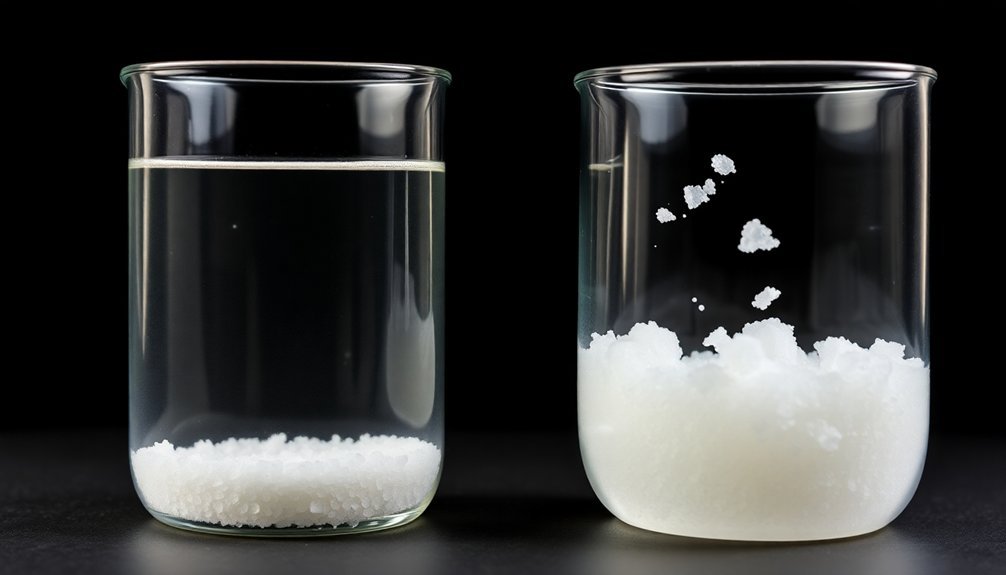
The distinct dissolution rates of kosher and sea salt play an essential role in fermentation success. When you're creating a brine solution, you'll find that kosher salt's coarse, flakey texture dissolves quickly in water, making it an excellent choice for maintaining consistent salinity levels throughout your fermentation process.
While both kosher salt and flaked sea salt dissolve rapidly enough for fermentation, there's a notable difference when you're working with crystalline sea salt. The crystalline form takes longer to dissolve completely, which can affect your brine's uniformity.
You'll get better results with either kosher salt or flaked sea salt, as they're practically interchangeable regarding dissolution speed. The quick dissolution rate of kosher salt makes it particularly advantageous when you're measuring and controlling salinity.
You won't need to wait or stir extensively to achieve a uniform brine solution. This efficiency is vital because inconsistent dissolution can lead to uneven fermentation results. By choosing a fast-dissolving salt like kosher salt, you're ensuring that your fermented vegetables or other items will be properly preserved and evenly flavored throughout the process.
Mineral Content Analysis
While kosher salt is pure sodium chloride without trace minerals, you'll find that sea salt naturally contains small amounts of magnesium, potassium, calcium, and other elements from the ocean.
Sea salt's mineral content can vary greatly based on its source, as seen in Celtic sea salt which contains 0.17% calcium and 0.3% magnesium.
If you're considering purity levels, kosher salt offers more consistency and predictability in its composition, while sea salt may retain both beneficial minerals and potential impurities from its marine origins.
Natural Trace Elements Comparison
Natural mineral composition marks the fundamental difference between kosher and sea salt. While kosher salt consists purely of sodium chloride without any additional minerals or additives, sea salt contains various trace elements from its oceanic source.
You'll find that sea salt's mineral content can vary considerably depending on where it's harvested, potentially affecting your fermentation process.
When you're fermenting foods, the presence of trace minerals isn't always beneficial. Here's why the simpler composition of kosher salt often works better:
- Predictable Results: Kosher salt's pure sodium chloride composition guarantees consistent fermentation without unexpected mineral interactions.
- Clean Flavor Development: The absence of trace minerals in kosher salt allows the natural flavors of your fermented foods to develop without interference.
- Better Control: You won't have to worry about variable mineral content affecting your brine concentration or fermentation time.
While sea salt's trace elements like magnesium, calcium, and potassium might seem appealing for their nutritional value, they're present in such small quantities that they don't greatly contribute to your daily mineral needs.
The pure, straightforward nature of kosher salt makes it the more reliable choice for fermentation projects.
Salt Purity Levels
Building on our understanding of trace elements, let's examine how purity levels in both salt types impact fermentation outcomes. When you're fermenting foods, the purity of your salt directly affects your results.
Kosher salt stands out with its singular composition of sodium chloride, free from additives and trace minerals that could interfere with fermentation. You'll find that kosher salt's purity translates to more predictable fermentation outcomes. Its consistent, uniform granules guarantee even distribution throughout your ferments, while the absence of anti-caking agents and other additives prevents unwanted chemical reactions.
The low moisture content also helps you maintain better control over your fermentation environment. In contrast, sea salt's varying mineral content, while nutritionally beneficial, can introduce unpredictable elements to your fermentation process.
These minerals might affect the flavor profile or potentially interact with the fermentation in ways you hadn't planned. While sea salt's natural origins are appealing, its inconsistent composition makes it less reliable for precise fermentation recipes.
You'll achieve more consistent results with kosher salt's standardized purity levels, especially when following specific fermentation protocols.
Cost and Availability Benefits
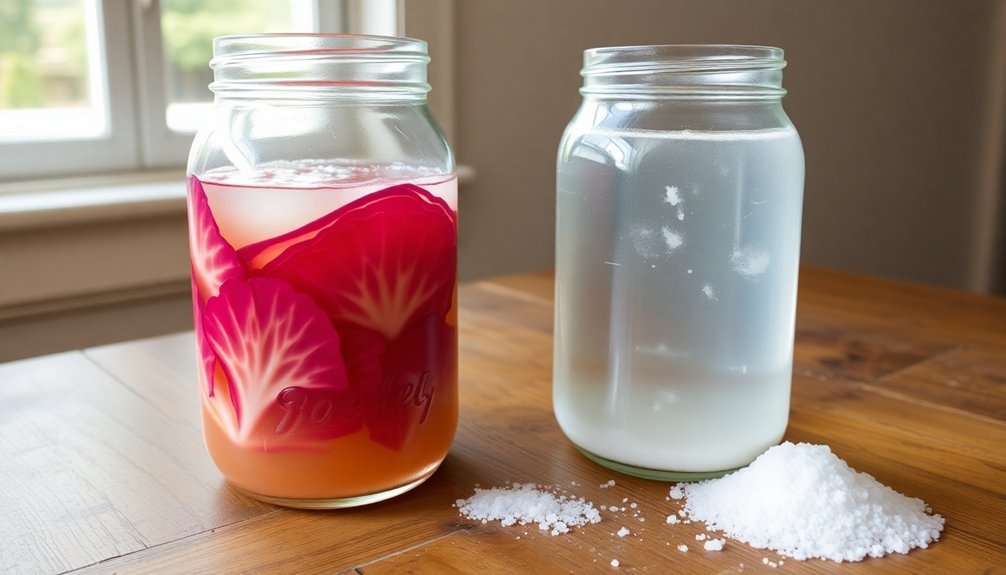
Smart fermenters often choose kosher salt for its significant cost and availability advantages.
You'll find that kosher salt is consistently cheaper than sea salt, especially when compared to artisanal varieties that require manual harvesting. This cost difference becomes particularly noticeable when you're fermenting regularly or in large batches.
The widespread availability of kosher salt makes it a practical choice for your fermentation projects.
You won't need to make special trips to specialty stores or search multiple locations, as it's readily available in most supermarkets and grocery stores. Plus, you can easily order it online if you prefer buying in bulk.
Here are three key benefits that make kosher salt a cost-effective and convenient choice:
- Lower price point without compromising fermentation quality
- Consistent availability in local stores and online retailers
- Easy to store and handle with minimal clumping
The storage benefits further enhance its value proposition, as you won't need special containers or handling procedures.
You can simply keep it in any airtight container, and its larger crystals resist moisture absorption, ensuring long-term stability for your fermentation needs.
## Anti-Caking Agents Impact
When you're choosing between kosher and sea salt for fermentation, you'll find that sea salt typically contains no anti-caking agents, while kosher salt may occasionally include them.
These artificial additives can interfere with the growth of beneficial bacteria essential for fermentation, potentially affecting both the process and final taste of your fermented foods.
Natural salts without anti-caking agents provide the cleanest environment for beneficial bacteria to thrive, making them the best choice for successful fermentation.
Anti-Caking Effects on Bacteria
The presence of anti-caking agents in kosher salt can subtly impact your fermentation's bacterial health. While these additives are generally safe and present in tiny amounts (less than 0.1%), they can influence how beneficial bacteria develop during fermentation.
You'll find that these agents don't completely stop fermentation but may slow down the process compared to using additive-free salt.
When using kosher salt with anti-caking agents, you'll want to monitor your fermentation closely. The effects aren't as severe as those from iodized table salt, but they can still affect your results.
Here's what you should watch for:
- Slower fermentation progression than usual
- Slightly cloudier brine appearance
- Reduced bacterial growth efficiency
If you're concerned about anti-caking agents, check your kosher salt's label carefully. The good news is that beneficial bacteria can still thrive despite these additives, though conditions mightn't be ideal.
While kosher salt's larger crystals offer advantages for fermentation, you'll need to weigh this benefit against the potential impact of anti-caking agents on your bacterial culture's health.
Natural Vs Artificial Agents
Natural anti-caking agents offer distinct advantages over artificial additives in fermentation processes. When you're choosing between kosher and sea salt for fermentation, you'll find that kosher salt's typical absence of anti-caking agents makes it the superior choice. This purity guarantees you won't introduce unwanted chemical elements into your ferments.
| Natural Properties | Artificial Additives |
|---|---|
| Clean flavor profile | Can alter taste |
| No interference with bacteria | May impact fermentation |
| Quick dissolution | Variable dissolution rates |
| Consistent results | Unpredictable outcomes |
| Better texture control | May affect final texture |
You'll notice that kosher salt's lack of additives contributes to a cleaner fermentation process, allowing the natural flavors of your vegetables to shine through. The absence of artificial agents means you're working with a more predictable ingredient, which is vital for consistent results. While some brands of kosher salt might contain anti-caking agents, you can easily find options without them by checking the label. This purity is especially important when you're creating fermented foods, as it reduces the variables that could affect the bacterial cultures essential to the fermentation process.
Measuring Salt Accurately
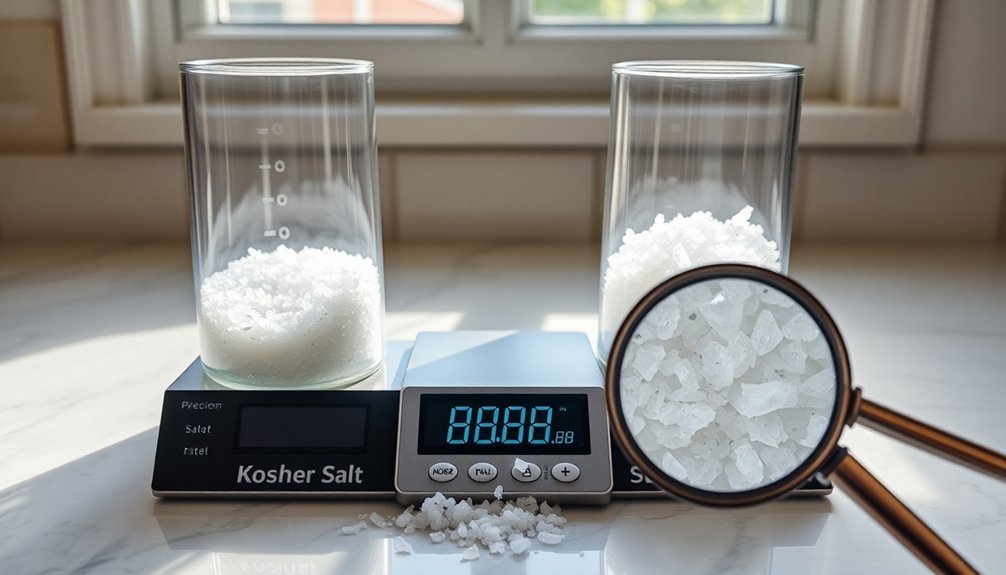
Accurate measurement stands as the cornerstone of successful fermentation, and choosing the right method can make or break your project. While you might be tempted to reach for measuring spoons, volume measurements can lead to inconsistent results due to varying salt densities.
Kosher salt's larger crystals create more air space, meaning a tablespoon of kosher salt weighs less than the same volume of sea salt.
To guarantee consistent fermentation success, you'll want to measure salt by weight rather than volume. A kitchen scale becomes your most valuable tool, allowing you to calculate precise salt concentrations regardless of the salt type you're using. For most vegetable ferments, you'll aim for a 2.5% salt concentration by weight.
Here's why weight measurement is superior:
- It provides consistent results across different salt types
- It allows you to calculate exact salt percentages for any batch size
- It eliminates the guesswork caused by varying crystal sizes and densities
If you're serious about fermentation, invest in a scale with a percentage function – it'll simplify your calculations and help you maintain precise salt ratios every time you ferment.
Brine Consistency Results
Understanding brine consistency reveals key differences between kosher and sea salt performance in fermentation.
While kosher salt's coarser grind makes it harder to dissolve compared to fine sea salt, this characteristic actually contributes to better results in your ferments. You'll need to dissolve kosher salt in warm water first, but the absence of anti-caking agents makes it worth the extra effort.
The slower dissolution rate of kosher salt helps maintain your vegetables' crispiness, and its mineral content can enhance this effect. You'll notice this especially when combined with tannin-rich leaves like grape vine or blackcurrant.
While fine sea salt dissolves more readily, it mightn't provide the same level of vegetable crunchiness that you'll achieve with kosher salt.
When measuring kosher salt, you'll need to account for its lower density by increasing the volume by 25% compared to fine sea salt.
While both salts offer similar flavor profiles in fermentation, kosher salt's coarser texture makes it easier to handle and measure accurately by weight.
Though fine sea salt provides a more neutral taste, the trace minerals in kosher salt contribute subtly to your ferment's overall quality.
Fermentation Speed Differences
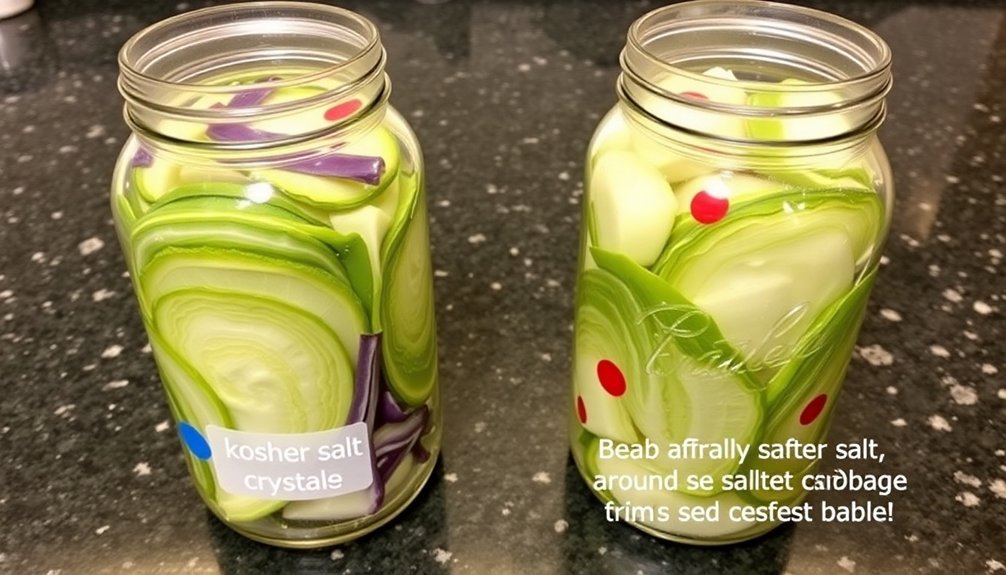
While brine consistency sets the foundation for fermentation, the speed at which your ferments develop hinges considerably on your salt choice. When you're using kosher salt, you'll notice a slower dissolution rate due to its larger, flaky crystals, which creates a more gradual fermentation process.
This slower pace can work to your advantage, especially when you're looking to maintain vegetable crunchiness and develop complex flavors.
Sea salt's quick dissolution rate means you'll get faster initial fermentation, but this isn't always ideal. The rapid salt dispersion can lead to quicker vegetable softening and mightn't contribute as much to long-term flavor complexity.
Here's what you'll experience with kosher salt's slower fermentation:
- Better texture control – vegetables retain their crunch longer as salt releases gradually
- More complex flavor development – the slower process allows for nuanced taste evolution
- Gentler microbial activity regulation – gradual salt dissolution helps beneficial bacteria thrive without sudden population changes
You'll find this measured approach particularly beneficial when fermenting delicate vegetables or when you're aiming for specific flavor profiles in your ferments.
Salt Storage Methods
Proper storage of your fermentation salts can make or break your preservation projects. When comparing kosher salt to sea salt for storage, you'll find that kosher salt offers distinct advantages that make it easier to maintain over time.
You'll appreciate kosher salt's naturally low moisture content, which greatly reduces clumping risks in storage. Unlike some sea salts that require special humidity considerations, you can store kosher salt in any standard airtight container without worry. The larger crystal size prevents compacting, so you won't need to break up hardened chunks when it's time to ferment.
While both salt types need protection from contamination, kosher salt's refined nature and larger crystals make it less susceptible to environmental factors. You don't need to worry about moisture absorption or degradation, which can be common issues with sea salt.
The refined composition of kosher salt also contributes to its longer shelf life, ensuring you'll have consistent results in your ferments even after extended storage periods.
When you're choosing containers, any airtight option will work well for kosher salt, whereas sea salt might require more specific storage conditions to maintain its qualities.
Professional Fermenters Prefer Kosher
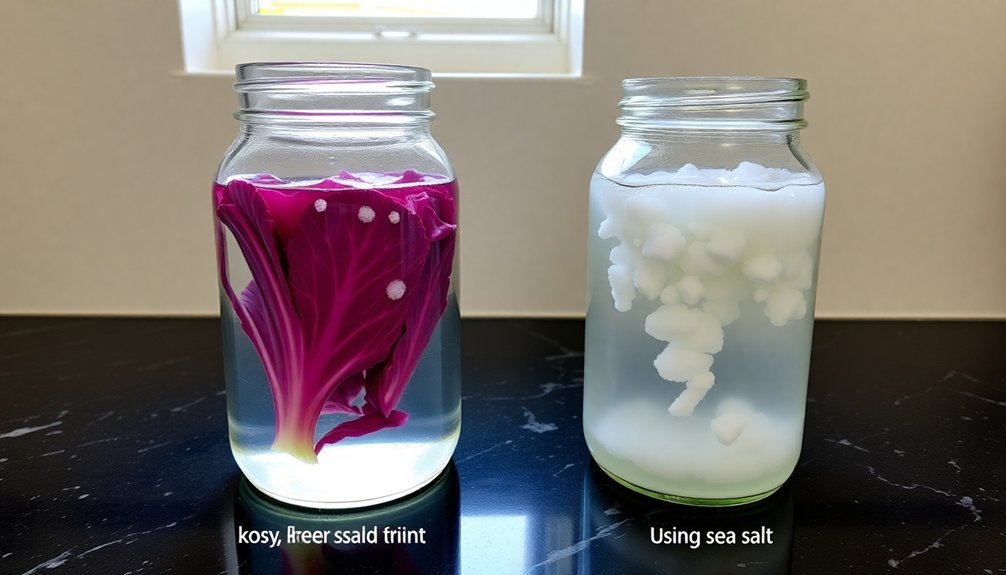
Professional fermenters consistently choose kosher salt over other varieties because of its superior performance in fermentation projects. Its coarse, flaky texture makes it easier to control portions and distribute evenly throughout your ferments.
You'll find that the lack of additives, particularly iodine and anti-caking agents, guarantees your fermentation process won't be disrupted by unwanted chemicals that could interfere with beneficial bacteria growth.
The effectiveness of kosher salt in creating the perfect fermentation environment is unmatched. You'll achieve the ideal 2-3% salt concentration with greater precision, and you can count on consistent results across different batches of fermented vegetables.
- You'll get better control over salt distribution thanks to kosher salt's larger crystals and lighter density.
- Your ferments will maintain their crisp texture because kosher salt effectively draws out moisture without over-salting.
- You can trust the purity of your fermentation process since kosher salt doesn't contain additives that might affect the final product.
When you're working with kosher salt, you'll notice it dissolves more readily in water, creating smoother brines and guaranteeing even salt distribution throughout your fermented foods.
Scientific Research Findings
Scientific studies back up what professional fermenters have long known about salt selection. Research confirms that kosher salt's lack of iodine and minimal anti-caking agents creates an ideal environment for beneficial bacteria to thrive during fermentation.
Studies show that iodine, commonly found in table salt but absent in kosher salt, can inhibit the growth of essential fermentation bacteria.
When you're measuring salt for fermentation, research indicates that kosher salt's larger crystals allow for more precise control over salinity levels. Scientists have determined that maintaining a 2-3% salt concentration is vital for successful fermentation, and kosher salt's consistent crystal size makes achieving this precise measurement easier than with sea salt's variable granule sizes.
While studies acknowledge that sea salt's mineral content can contribute additional nutritional benefits, they've found no significant advantage in fermentation effectiveness.
In fact, research suggests that kosher salt's purity and predictable composition make it easier to replicate successful fermentation results. The scientific data also supports that kosher salt's clean, straightforward flavor profile doesn't interfere with the natural taste development during fermentation.
Frequently Asked Questions
Can Kosher Salt and Sea Salt Be Mixed for Fermentation Projects?
You shouldn't mix kosher and sea salt for fermentation, as their different crystal sizes and properties can lead to inconsistent results. It's best to stick with one type of salt for reliable fermentation outcomes.
Does the Color of Salt Affect the Final Taste of Fermented Foods?
No, you won't notice taste differences based on salt color alone. While salts like Himalayan pink or black sea salt look different, they don't noticeably affect your fermented foods' flavor unless they contain specific additives.
How Long Can I Store Salt Before It Affects Fermentation Quality?
You can store salt indefinitely as long as you keep it in an airtight container in a dry place. It won't affect fermentation quality with age, but make sure it stays moisture-free to prevent clumping.
Are There Specific Vegetables That Work Better With Kosher Salt Fermentation?
You'll get great results fermenting high-water vegetables like cabbage, cucumbers, and leafy greens with kosher salt. It's especially effective for kimchi and sauerkraut, helping extract natural juices during fermentation.
What Happens if I Accidentally Use Iodized Salt in My Ferment?
Don't worry if you've used iodized salt – your ferment will be fine. Research shows it won't harm beneficial bacteria or affect the fermentation process. You'll still achieve proper pH levels and stable results.
In Summary
You'll find kosher salt's clean, pure composition and consistent crystal structure make it the superior choice for fermentation. Its rapid dissolution rate guarantees even brine distribution, while the lack of additives or trace minerals helps maintain predictable fermentation results. When you're investing time in fermentation projects, kosher salt's reliability, availability, and cost-effectiveness simply can't be beaten – which is why professional fermenters consistently choose it over sea salt.

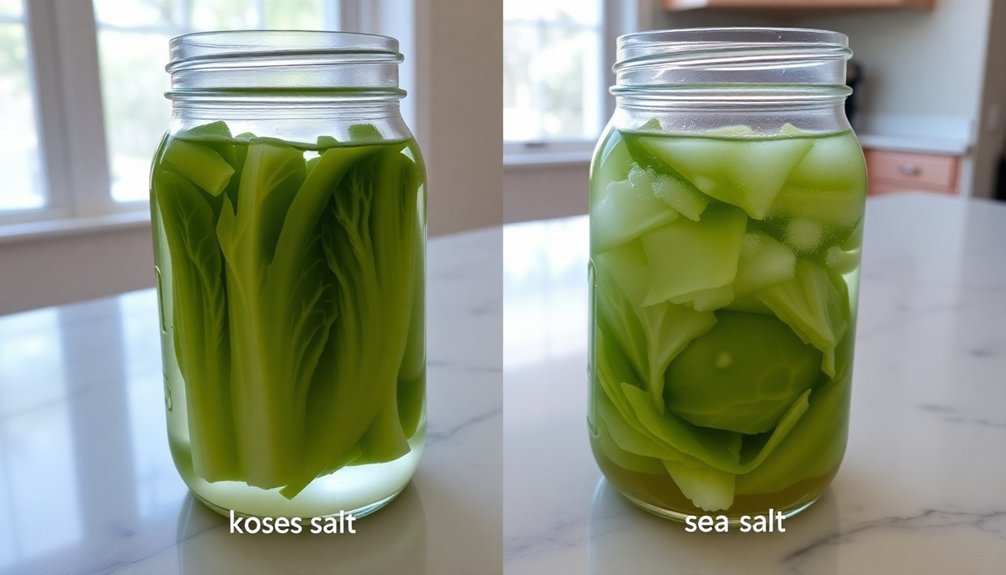

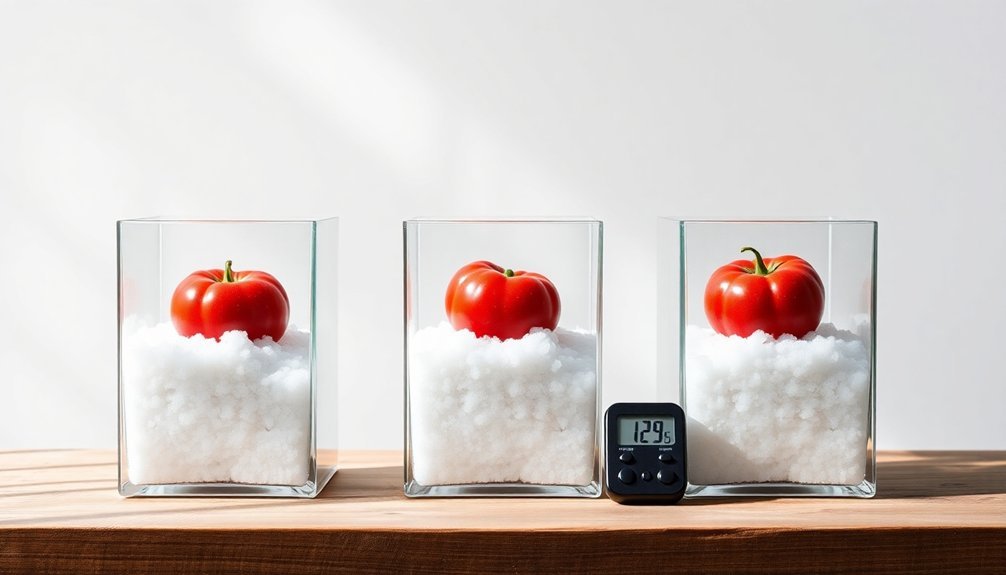
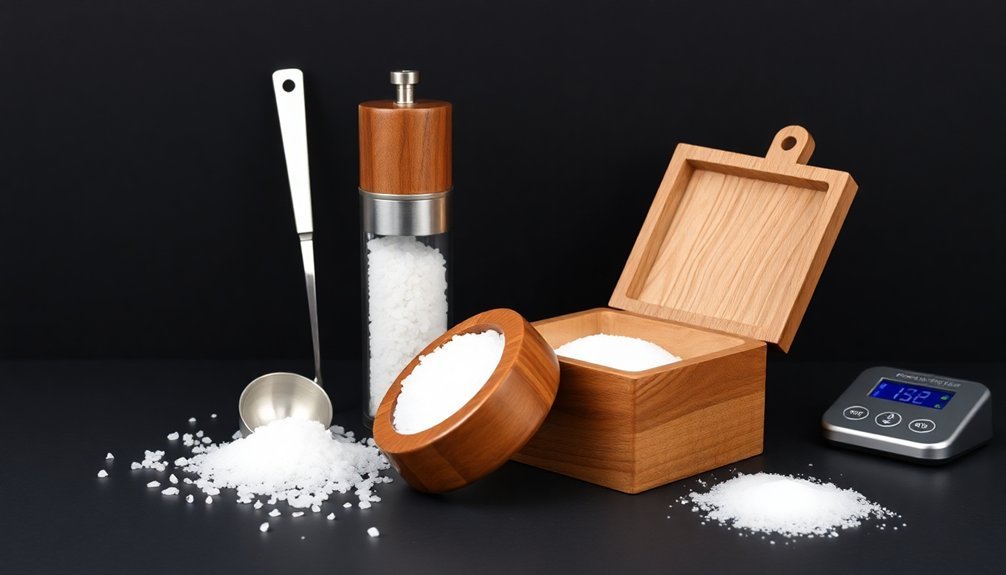
Leave a Reply